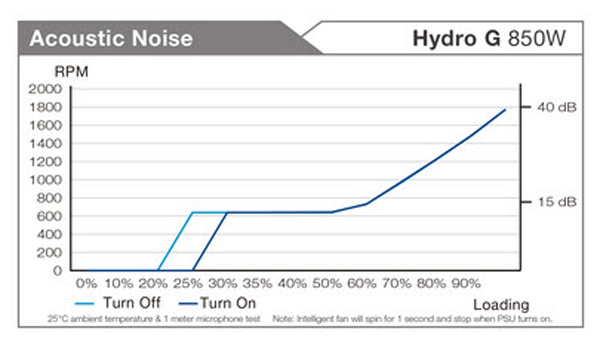Efficiency, Differential Temperature and Noise
Efficiency
Efficiency is defined by the power output divided by the power input and is usually expressed as a percentage. If a PSU were a 100% efficient (which none are) 850 watts of AC power going in would result in 850 watts of DC power coming out (with no waste heat to dissipate). In the real world there are always inefficiencies and power is lost in the form of heat during the conversion process. Newer revisions to the ATX12V Power Supply Design Guide V 2.2 have continued to increase the efficiency recommendations for PC switching mode power supplies and now lists both required and recommended minimum efficiencies.
We measured the AC power input to the Hydro G 850W PSU with an Extech power analyzer while the total DC load was found by adding all the individual +3.3V, +5V, +12V, -12V and +5VSB loads together.
The overall efficiency of the FSP Hydro G 850W power supply is very good and easily meets the criteria for 80 Plus Gold certification, even while operating on 120 VAC and at elevated temperatures. Note how flat the efficiency curve is, showing the PSU is operating near 90% efficiency over the most used load range.
80 Plus Program
Note: Tests conducted at room temperature (25°C)
Differential Temperature and Noise Levels
To simulate a demanding environment, some of the warm exhaust air from the PSU under test is recirculated back to the intake through a passive air duct, which allows the PSU air inlet temperature to increase with load, just like it would in a real PC.
The differential temperature across the power supply was calculated by subtracting the internal case air temperature (T in) from the temperature of the warm exhaust air flowing out the back of the power supply (T out).
Thermocouples were placed at the air inlet and exhaust outlet. The ambient room air temperature was 23ºC (74ºF) +/- 0.5ºC during testing.
T out = temperature of air exhausting from power supply
T in = temperature of air entering power supply
Delta T = T out – T in
Sound pressure level readings were taken 3’ away from the rear of the case in an otherwise quiet room. The ambient noise level was ~27 dBA.
*Fan not spinning
The FSP Hydro G 850W PSU cooling fan did not start spinning until the 50% load test. At the 75% load mark the fan noise was still quiet and even at the 100% load mark the fan noise never really became loud. Having good efficiency helps keeps the waste heat and fan noise to a minimum.
(Courtesy of FSP)













Why would you brand something
Why would you brand something “Hydro” when it has no provision for watercooling? We sadly haven’t seen a WC-capable PSU for quite some time.
There hasnt been a need for
There hasnt been a need for watercooling PSU these days with higher efficiency components used.
For ATX monsters maybe, but
For ATX monsters maybe, but if you want something more compact (e.g. SFX, FlexATX) where you are limited in maximum fan size by case dimensions, being able to offload cooling for the system to a central radiator is a huge benefit for noise and case volume.
maybe it’s me, but using
maybe it’s me, but using water as a name for a power supply just doesn’t sound right.
I thought maybe it was a
I thought maybe it was a liquid cooled power supply. Just what I need in my system, more radiators and fans.
In fact FSP already has
In fact FSP already has liquid cooled PSU and it is called HYYDRO PTM+
Just a note if anyone is
Just a note if anyone is reading this, I bought this PSU a week ago and it came with two 8 pin CPU connectors.Both on one cable, first one is 8 pin, second is 4+4. Around 15 cm between them.